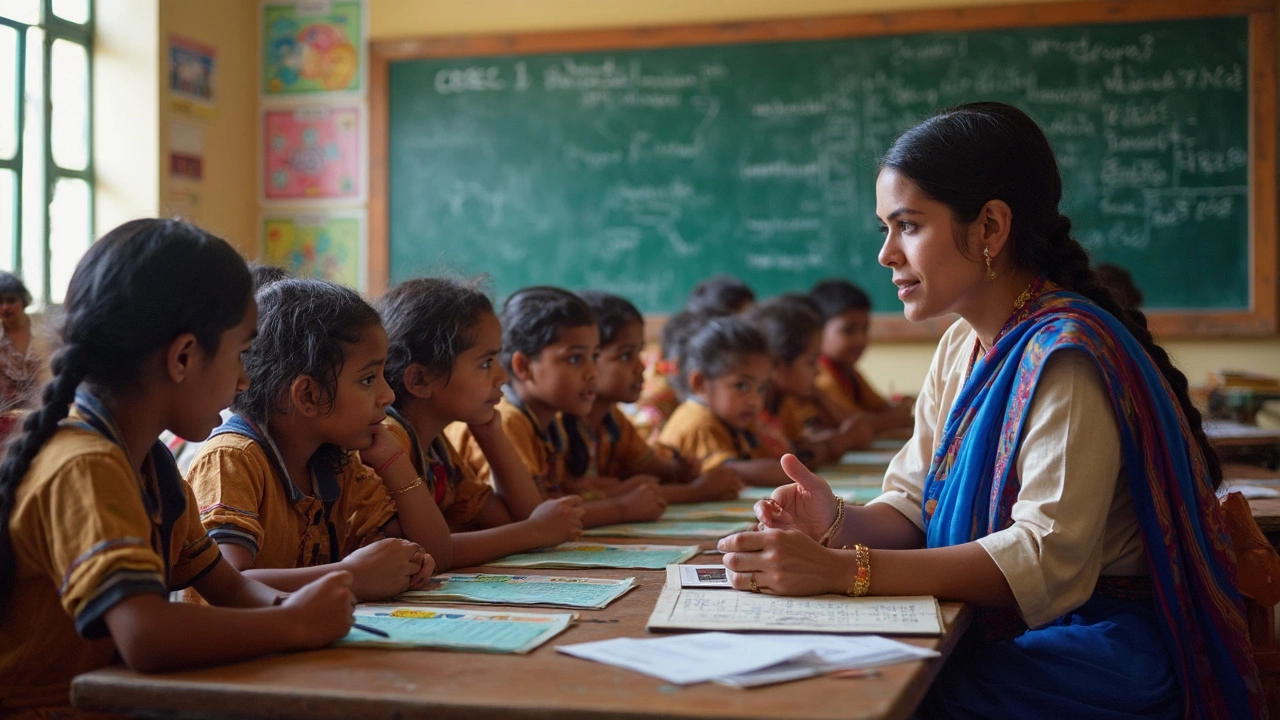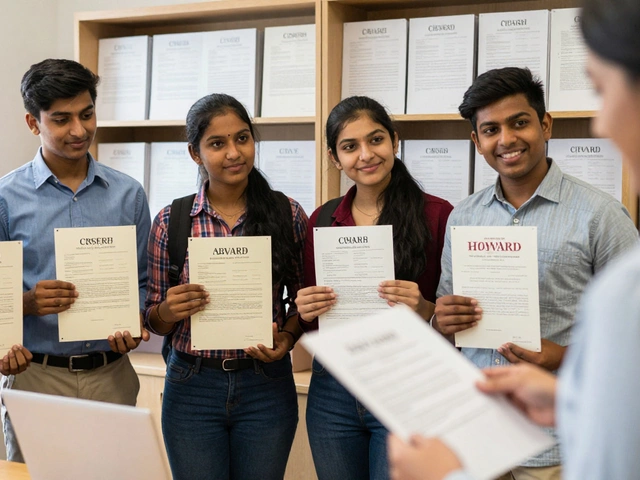Picking a school board isn’t just a box to tick. Get this wrong, and your child could end up trudging through years of boredom or unnecessary stress. For loads of Indian parents, CBSE is the default. But is it really the best fit for every child?
The Central Board of Secondary Education—yeah, that’s CBSE—is everywhere. Nearly 25,000 schools (seriously!) across India and even some outside the country run on this board. Popular? Totally. But what actually makes it tick, and does popularity mean it’s right for your child?
If your kid’s aiming for entrance exams like JEE or NEET, here’s a fun fact: those exams are based on the CBSE syllabus. That gives CBSE kids a bit of a head start. But if your child loves projects, digging deep into one topic, or more creative lessons, the standard CBSE method may feel a little flat.
The daily study grind matters just as much as the exam results. So before filling out school forms, it’s smart to think about what your child’s strengths are—and where they struggle. A board that doesn’t match their style can turn even talented kids into reluctant learners.
- What Is the CBSE Syllabus, Really?
- How Does CBSE Shape Your Child’s Learning?
- CBSE vs Other Boards: Where Does It Stand?
- Who Benefits Most from the CBSE Approach?
- Pro Tips for Parents Navigating the Choice
What Is the CBSE Syllabus, Really?
If you ask most parents, they’ll say the CBSE syllabus is that 'central board thing' kids learn in school. But once you dig in, it’s actually pretty straightforward. The Central Board of Secondary Education is run by the Indian government. Its syllabus sets up clear what-to-study lists from Class 1 through Class 12, sticking to subjects like English, Hindi, science, maths, and social studies—plus add-ons like computer and physical education. CBSE updates its syllabus almost every year to keep up with new trends, exam styles, and education goals.
One of the biggest things about CBSE is its focus on standardization. No matter if your child is in Mumbai or in a tiny school up north, the curriculum is the same. This makes life way easier if your family moves around a lot. Kids don’t fall behind or have to learn a whole new system at every transfer.
The main subjects follow the NCERT textbooks (the official books recommended by the board). These books are used not just for school exams but for big national entrance tests too. CBSE also follows a more objective, exam-friendly approach—the questions often want short, to-the-point answers instead of long essays.
“CBSE curriculum is built around the idea of preparing students for national-level competitive exams and foundational life skills.” — Dr. Anurag Tripathi, Former Secretary, CBSE
This table shows the basic structure of subjects in the CBSE syllabus:
| Level | Main Subjects | Elective/Additional |
|---|---|---|
| Primary (Classes 1-5) | English, Hindi, Maths, EVS | Computer, Art, GK |
| Middle (Classes 6-8) | English, Hindi, Science, Social Science, Maths | Third Language, ICT |
| Secondary (Classes 9-10) | English, Hindi, Maths, Science, Social Science | Skill-based, IT, Physical Education |
| Senior Secondary (Classes 11-12) | Streams: Science, Commerce, Humanities | Electives within stream |
So, if you like the idea of a stable, well-recognized, and transferable syllabus, CBSE definitely ticks those boxes. It’s straightforward, keeps you prepared for Indian competitive exams, and your kid gets evaluated on concepts, not just memory.
How Does CBSE Shape Your Child’s Learning?
CBSE has a pretty clear reputation for being book-focused, structured, and no-nonsense. Its curriculum is the same whether you’re living in Chennai or Chandigarh, so if your family moves a lot, your kid won’t be lost. One big plus? The board updates its material every few years to match what’s happening in science, tech, and society. No super old stuff that makes students yawn.
What does CBSE really do for your child’s day-to-day learning? The board leans hard on CBSE syllabus textbooks (mostly NCERT publications). These aren’t just randomly chosen chapters. They’re carefully planned so every year builds on what was taught before. The approach is step-by-step, making it easy for most students to keep up, even if they aren’t superstars. There’s a lot of focus on math and science—good news if your kid is eyeing engineering or medicine.
While CBSE includes projects and assignments, it’s mostly theory. The board tries to make things student-friendly, but let’s be real: exams still matter a lot. A school principal once summed it up perfectly:
“CBSE works well for students who are disciplined and exam-focused, but kids who learn differently might feel boxed in unless teachers use some creativity.”
Parents often ask if CBSE is too focused on memorizing. There’s some truth there, but things are changing. The board has started asking questions that need some real-world thinking, not just straight-from-the-book answers. Here’s a quick look at what CBSE pushes versus what it doesn’t:
| CBSE Strength | Impact on Students |
|---|---|
| Consistent textbooks (NCERT) | Smooth learning, easy transfers |
| Heavy focus on math/science | Prep for competitive tests |
| Regular syllabus changes | Up-to-date content |
| Mainly written exams | Rewards good memory and practice |
| Growing trend towards practicals | Still developing, not main focus yet |
If you’re wondering about language options, CBSE offers both English and Hindi mediums, which gives flexibility. Plus, from Class 9 onwards, there are electives—like coding, mass media, and creative writing—though math, science, and English still take up most of the timetable.
Bottom line? CBSE can shape kids into strong exam-takers with a solid base in core subjects, but it’s on you (and their school) to spark that extra curiosity and hands-on work outside the textbook.

CBSE vs Other Boards: Where Does It Stand?
Most parents hear about three main boards in India: CBSE, ICSE, and State Boards. Throw in international ones like IB and Cambridge, and things get crowded fast. So, how is CBSE syllabus different from these?
CBSE is big on streamlined textbooks and a national focus. Every CBSE school follows the same system. That means if you need to move to a new city for work, your child can switch CBSE schools easily without skipping a beat. Most state boards, on the other hand, use their local language and base topics around state needs. ICSE and international boards lean heavier on English and have way more project work.
If you’re looking at marks and curriculum flexibility, here’s more info to make sense of things:
| Board | Main Language | Focus | Number of Schools | Entrance Exam Alignment |
|---|---|---|---|---|
| CBSE | Hindi/English | Science, Math, national relevance | ~25,000 | Directly matches (JEE, NEET, etc.) |
| ICSE | English | Arts, Language, project work | ~2,500 | Not fully aligned |
| State Boards | Regional | Local issues, language, basic academics | Varies by state | Sometimes matches, not always |
| IB/Cambridge | English | Critical thinking, global exposure, projects | Few hundred (India) | No alignment; best for overseas studies |
CBSE’s real strength? It’s built to get kids ready for major entrance tests and is less about essays or creative exercises compared to ICSE or international boards. But if you want your child to grow skills like public speaking, group projects, or real-world problem solving, ICSE or IB can give that extra push.
Still, CBSE’s nationwide reputation makes it a safe bet if your family moves a lot, or if you want consistency through your child’s early years. And let’s get real—many top schools in India stick with CBSE because it’s less expensive and easier to manage compared to the fancy international options.
Bottom line: look at your child’s learning style and family needs. No board is perfect, but they do have real, concrete differences. This isn’t just about scoring marks—think about where your child will enjoy learning and get set up for success.
Who Benefits Most from the CBSE Approach?
CBSE isn't a one-size-fits-all board, but there are some clear types of students who tend to fit right in. Usually, kids who are aiming for competitive exams, like JEE or NEET, get the most out of the CBSE syllabus. That's because the pattern, structure, and speed of CBSE teaching lines up nearly perfectly with what those entrance tests want.
Let’s break down who really gets the most value:
- Exam-Oriented Students: If your child is comfortable with textbooks, direct questions, and less project work, CBSE feels familiar. It’s all about nailing the basics.
- Frequent Movers: Families who relocate often due to jobs (especially government employees) will appreciate CBSE’s uniform syllabus nationwide. No mid-year catches or gaps to worry about.
- English and Hindi Medium Learners: Since most CBSE schools offer both options, kids get language flexibility.
- Focused on Indian Curriculum: Those wanting a deep dive into Indian history, civics, and national-level studies will find CBSE a good match.
According to a 2023 report from India’s Ministry of Education, 85% of students appearing in national engineering and medical entrance exams came from CBSE backgrounds. No coincidence—CBSE is closely tied to these tests. Here’s how the distributions actually look:
| Competitive Exam | CBSE Students (%) | Other Boards (%) |
|---|---|---|
| JEE Main | 88 | 12 |
| NEET | 82 | 18 |
"The CBSE board gives a solid foundation in science and math, which is why it's the most popular choice among students preparing for national entrance exams," says Dr. S. Rajagopalan, an education expert at the National Institute of Open Schooling.
But there’s a flip side—creative kids who thrive on open-ended projects or international content might find CBSE’s focus a bit limiting. If your child likes to stick to clear rules, excels at regular testing, and is planning to write major Indian entrance exams, CBSE could be a game-changer.

Pro Tips for Parents Navigating the Choice
Trying to make sense of all the talk about school boards? It’s normal to feel overwhelmed. But some real-life tips can make the process less daunting—and way more productive for you and your child.
- CBSE syllabus is built for consistency. Since thousands of CBSE schools use the same content, moving between cities (or even countries) won’t mess up your kid’s learning. If your family relocates for work often, this board honestly makes life easier.
- Check your child’s stress response. CBSE still leans heavily on exams and standardized tests. If your kid finds exams terrifying, don’t ignore that. Ask their teachers how much support they offer for test nerves or extra help outside class.
- Get a peek at the actual textbooks and papers. CBSE books are laid out in a very logical way—good for kids who like learning step-by-step. But if your child is super curious or loves hands-on experiments, they might crave more variety than the board typically offers.
- See what “extra” stuff each CBSE school brings in. Some schools stick to the minimum. Others go big on coding clubs, art, sports, or project-based learning—even within the same board. Always ask what a regular week actually looks like before enrolling.
- Don’t forget how school results stack up. Here’s a look at India’s CBSE Class 10 pass rates over recent years—notice how high it stays:
| Year | CBSE Class 10 Pass Rate |
|---|---|
| 2021 | 99.04% |
| 2022 | 94.40% |
| 2023 | 93.12% |
| 2024 | 93.60% |
Pretty impressive, right? But also check how students from each school are doing in real life—talk to alumni or teachers if you can. The pass rate only tells part of the story.
Finally, listen to your kid—really listen. Their happiness and confidence matter more than a perfect board on paper. When in doubt, ask them what kind of classes or projects they enjoyed most, and use that to guide your decision. You know your child better than anyone else.




